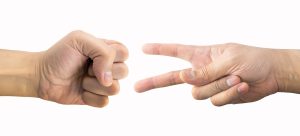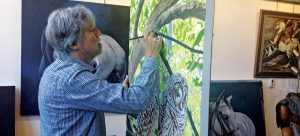
Striking The Right Note
But the question remains, where’s the feeling?
By Jane Borden
“Technically, it’s perfect,“ my piano teacher said when I finished playing. “But where is the feeling?“ For decades afterward, I never thought of this question. Now, I can’t get it out of my brain.
I’d studied with her for years and in that time had conquered several complicated classical works and nailed every recital, but never considered that true musicians don’t approach their work as conquering or nailing. However, neither did I harbor professional-musician dreams. I was old enough to start choosing paths. When my teacher charitably suggested she’d done all she could, I took the hint. I’m not a musician: big-deal-so-what?
Recently, though, the memory popped into my head as a specter of something else. “Where is the feeling?” The implications are terrifying. Do I move through life hitting all the right notes, always at the right times, but never connecting with any of it? I worry that I live a cold and surface-level life. I worry that my piano teacher was sussing whether I’m sentient or AI.
Adulthood is a thawing. Once the distractions of growing are gone, one’s focus turns unbidden to the self, to layers of uninvestigated life. Daily, I am visited by some past shame — either exacted upon me or by me — that didn’t upset me at the time, and so waited until age and experience revealed why it should have. They bubble into my prefrontal cortex, like dormant strains of bacteria buried in the now melting arctic tundra that are coming to ravage us all. Perhaps this bubbling is the cause of midlife crises. We buy sports cars to drive away from ourselves.
Mine isn’t a midlife crisis, thankfully, because I can’t afford a car. But my husband and I did inherit a piano. So I’m trying to play, once more with feeling.
In July, Nathan and his father drove the piano across the country, stopping occasionally at canyons, in between long stories about their deep history and long silences about the road. Four days later, the piano arrived, hulking and haughty, like a Broadway star. Pianos are intimidating, as instruments go. They don’t fit in your pocket or over your back. You can’t hold or handle one. There’s no curve to cup or angle to grasp. Male musicians don’t wax about making love to a piano — the instrument wouldn’t submit itself to that condescension. A piano commands your attention, constantly reminds you of its presence. But it doesn’t invite you to play. Rather, it tilts its head, peers down its aristocratic nose, and sighs, “If you must.”
Bitch, I will! I played a piece three times through before realizing my left hand was in the wrong key.
The piece is “Coming Around Again” by Carly Simon. The album of the same name had been a sensation in my family. It lived in the tape deck in my mother’s Audi. On long drives to the coast we’d finish side B and start side A anew. I remain an enormous fan of Carly. She makes me feel stuff. Plus, the song’s title is a nice pun on my experiment.
It is plodding to read music, an emotionless effort by nature, all inelegant math and uncoordinated fingers. After an hour and a half, I am able to play the right hand all the way through, though not without frequent pauses. It is a collection of notes, not music.
In 1987, “Coming Around Again” was considered a comeback album, giving the title track a double meaning. The song appeared in the film, Heartburn, about the breakup of a marriage and family. The lyrics also seem to represent the breakup of a marriage and family, but ultimately, the song is hopeful. Simon wrote it herself. She remarried the year it was released, three years after her divorce from James Taylor. It’s tempting to connect to the dots.
As a child, I understood all of this, but not really. Children can’t fully comprehend the horrors of human existence. I believe this to be by design, a kind of defense mechanism. Otherwise, we’d never make it through adolescence. We’d kill ourselves instead, and the animals would be like, “Where did the people go? Oh, they figured it out. What a bunch of wimps.”
Perhaps, then, youth was the attribution for my inability to feel music as a student, except of course that many of my teacher’s students did feel music, or I wouldn’t have been an exception. Still, when I hear the song now, as a wife and mother, I am overcome with grief. Simon was my age when she released it. I wonder if past shames bubbled in her brain too.
The piece slowly comes together in my hands. I am reminded of that magical transition when notes no longer exist on the page or in the head, but literally in the hands. As a writer, I experienced this sensation while typing or handwriting. But for more than a decade, I’ve dictated my work, an accommodation required by chronic shoulder tendinitis. Creativity lives in my throat now. Feeling it in my hands is like hugging an old friend.
Our 4-year-old, Louisa, fiddles around on the piano constantly, as we hoped she would. She and the piano’s previous owner, my husband’s recently deceased grandmother, share a birthday. Sometimes when Louisa plays, a melody calls out from the chaos. Occasionally, she repeats it. I wonder if true connection to music exists only when one has written a tune oneself. Reading sheet music is akin to acting, another skill I don’t possess.
I reach a point where the repetition is comfortable and my hands move somewhat automatically, allowing a small freedom to think or feel anything else. There’s a reverie in repetition, like participating in Gregorian chants. Then I hit a transition and play the wrong chord, and what I’m feeling is frustration. I’m not a natural. The chords will never be second nature. Always thinking about where my fingers are, I’ll remain moored to the machination and never be lost. It’s hard to enjoy the scenery when you’re the one driving the car. Also, I hate driving.
Does my daughter feel anything when she fiddles on the keys? I ask. “No fear!” she shouts. This is unexpected and would strike me as profound except she’s 4 and also believes that she has a brother and sister in Alaska, and that her body paints her poo brown. Still, this isn’t a phrase she’s said about other activities. I ask what she feels when we listen or dance to music. “No fear!,” she shouts again, like a skateboarding ad from the ’90s.
The more I play, patterns emerge. It becomes easier to remember the notes as I see how they all fit together. Still, this is closer to art appreciation than art. I take a cue from my child and improvise. In little time, I’ve composed a brief and strange tune. No need to alert Sony Music, but it was fun. When experimenting, you don’t beat yourself up for hitting a wrong note. There isn’t right or wrong. Then I look at my phone and realize it wasn’t a “little” time, but quite some amount of it. Where did I go?
I’ve noticed before that I am only a good dancer when I don’t pay attention. Occasionally, I’ll notice my moves and think, That was cool, and try to repeat it. Immediately, I misstep. It’s like when you realize you’re dreaming and therefore wake up. In an instant, I go from queen of the dance floor to literally tripping, losing the rhythm so completely that I have to start over by gently swaying from side to side. Blame it on pride.
Pride is why we turn melodies into symbols on sheets of paper. We think we’ve created something good. We want to tell the world. I’m putting symbols on paper now. My tendinitis was caused by typing excessive amounts of symbols — a prideful act that literally handicapped me. More recently, I’ve begun developing back problems from spending too much time driving a car.
The babysitter showed Louisa how to play “Mary Had a Little Lamb.” Now it’s all she wants to do. But she’s too young to understand or memorize the sequence. With each mistake, she cries harder, banging the piano in frustration, until eventually she refuses to try and demands I play instead.
She and Nathan leave me at home on a Saturday with a half-day to practice. After a couple of hours, I’m finally hitting all the right notes at all the right times. I nail the transitions. I conquer the bridge. The verses are in my hands. We are rollicking, the piano and I, and for a moment, I am not driving. I ride the crescendo to the chorus. But before I reach the resolution, my shoulders begin to ache. I misstep, lose my rhythm and take a break. OH
Jane Borden is a Greensboro native living in Los Angeles. She knows nothing stays the same, but if you’re willing to play the game, it’s coming around again.





